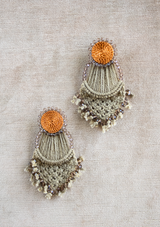Eucalipt Macramé Copper Earrings
These earrings boast a captivating rhombus-like shape, featuring a delicately woven circle atop that exudes sophistication. Hand-embroidered crystals adorn the circle, adding a touch of allure and brilliance to your ensemble. The rhombus design culminates in a macramé finish, exquisitely detailed with the same enchanting crystals.
These earrings transcend the ordinary, crafted from natural hand-dyed cotton threads. The intricate design captures attention, while the embellished circle and crystal embroidery add an ethereal touch to your appearance. Handcrafted with utmost precision, each piece narrates its own tale. No two knots or curves are identical, celebrating the uniqueness of every creation. In a world dominated by mass production, these earrings stand as a testament to the charm of the handmade.- Size: 4 x 3 inches
- Worldwide Shipping
- Delivery: 5 days after the order is placed
Discover the world of unique handmade earrings that honor tradition, celebrate innovation, and ignite empowerment. Step into elegance, grace, and meaningful connection. Add Midnight Breeze Earrings to Your Collection Now!

INCOME

 The norm in rural areas is that children between the ages of 10 to 12 work the fields with their parents taking care of crops.
The norm in rural areas is that children between the ages of 10 to 12 work the fields with their parents taking care of crops.SCHOOLING


58% of the people that live in rural areas in El Salvador live in overcrowded conditions. When there is overcrowding in families, there is a higher risk of certain problems occurring, such as domestic violence, family disintegration, poor school performance, among others.

300 SALVADORANS TRY TO MIGRATE TO THE UNITED STATES DAILY DUE TO LACK OF WORK OPPORTUNITIES.
When Lula Mena began working in rural communities, many of the young women wanted to immigrate to the United States. Now that they have seen that there is an opportunity for a better life in their community, their perception of immigration has changed. They feel more confident that they will be able to provide for their families without having to leave the country. We want to continue to grow in order to offer more young adults the opportunity to work with us and avoid immigration.

One of the major challenges we faced when we began working with women was gaining the approval of their husbands. Most of the husbands and family members worried that the women would not be able to work and meet the household’s responsibilities.
Now, their husbands prepare dinner, take care of the children, and offer them support. There is still a strong sexist culture, “machismo”, in rural areas of El Salvador that we are trying to change by empowering women.





